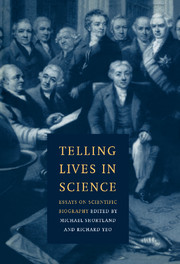Book contents
- Frontmatter
- Contents
- List of contributors
- Preface
- Introduction
- 1 Existential projects and existential choice in science: science biography as an edifying genre
- 2 Life-paths: autobiography, science and the French Revolution
- 3 From science to wisdom: Humphry Davy's life
- 4 Robert Boyle and the dilemma of biography in the age of the Scientific Revolution
- 5 Alphabetical lives: scientific biography in historical dictionaries and encyclopaedias
- 6 The scientist as hero: public images of Michael Faraday
- 7 ‘Tactful organising and executive power’: biographies of Florence Nightingale for girls
- 8 Taking histories, medical lives: Thomas Beddoes and biography
- 9 The scientist as patron and patriotic symbol: the changing reputation of Sir Joseph Banks
- 10 Metabiographical reflections on Charles Darwin
- Index
1 - Existential projects and existential choice in science: science biography as an edifying genre
Published online by Cambridge University Press: 28 October 2009
- Frontmatter
- Contents
- List of contributors
- Preface
- Introduction
- 1 Existential projects and existential choice in science: science biography as an edifying genre
- 2 Life-paths: autobiography, science and the French Revolution
- 3 From science to wisdom: Humphry Davy's life
- 4 Robert Boyle and the dilemma of biography in the age of the Scientific Revolution
- 5 Alphabetical lives: scientific biography in historical dictionaries and encyclopaedias
- 6 The scientist as hero: public images of Michael Faraday
- 7 ‘Tactful organising and executive power’: biographies of Florence Nightingale for girls
- 8 Taking histories, medical lives: Thomas Beddoes and biography
- 9 The scientist as patron and patriotic symbol: the changing reputation of Sir Joseph Banks
- 10 Metabiographical reflections on Charles Darwin
- Index
Summary
All the people of this lonely world, have a piece of pain inside. (Eurhythmies, ‘When the day goes down’)
Introduction
During the last decade an increasing number of high quality biographies of scientists have appeared on the book market1 – Richard Westfall's Newton study, Never at Rest, William Provine's Sewall Wright and Evolutionary Biology, Crosbie Smith and Norton Wise's study of Lord Kelvin and Victorian England, David Cassidy's Heisenberg biography, Geoffrey Cantor's study of Faraday, Adrian Desmond and James Moore's Darwin tome, and Frederic Holmes's first volume on Hans Krebs – just to name some of the most admirable works. Athough still within the traditional confines of the genre, these and similar biographies are more detailed, better researched, more stylishly written, and more penetrating than almost any biography written just a generation ago. Each new biography seems to be unrivalled. For someone who browses through the history of science shelves of an academic bookstore these works indicate that science biography stands out as a most – if not the most – impressive genre of the discipline.
In spite of the recent flourishing state of science biography, however, there is a widespread ambivalence and uncertainty as to the role and place of biography among historians of science. Biographical studies have dominated the history of science for most of its existence:
- Type
- Chapter
- Information
- Telling Lives in ScienceEssays on Scientific Biography, pp. 45 - 84Publisher: Cambridge University PressPrint publication year: 1996
- 19
- Cited by



